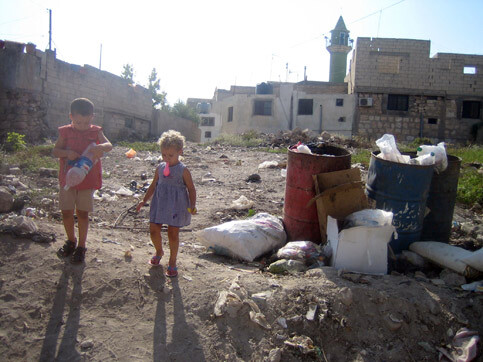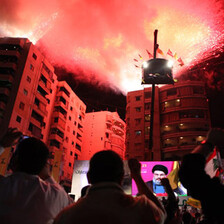Tyre 18 September 2006

Children in Tyre suffer trauma from the ordeal of living through war. (Serene Assir/IRIN)
I spent most of Lebanon’s month-long war in the southern coastal city of Tyre working as an interpreter for a British television station. Media from around the world resided at the Resthouse, a comfortable beach/hotel compound on the southern end of the city. It was a stopping point for thousands of fleeing southerners and a launching point for a number of somewhat scary forays into the deep south for journalists.
Tyre was not attacked as much as the villages around it, but a six-story building in the middle of town was leveled and before I arrived at the beginning of the war, a high residential building housing the Civil Defense was bombed. There was also the commando raid at the city’s northern end that kept most of us up fearing that the Israelis were invading by sea.
It is true that Israel’s military campaign flip-flopped often and its goals kept changing, but the assault on civilians, particularly of the south, was relentless. I arrived in Tyre on the tenth day of the war just as the remaining inhabitants of the south were beginning to realize that Israel would spare no one.
They all tell us that this assault is different from what they’ve seen from Israel in previous attacks. (Israel has invaded Lebanon twice before in 1978 and 1982, occupied various portions of the country for over 25 years, and launched massive military assaults focusing on civilians and their infrastructure in 1992 and 1996.) People who’ve never left their village were now leaving. They would arrive at the Resthouse shell-shocked and thirsty, hardly believing that they were still alive.
The shape of the war became clear within the first week or so. Lebanon’s infrastructure from the airport to bridges and roads were bombarded and an air, sea and land blockade was imposed, all in the name of preventing weapons from reaching Hizballah. A campaign of terror against civilians quickly followed. People’s homes were destroyed on top of them and those who fled were cold-bloodedly murdered in their cars, vans or buses.
Corpses were rotting underneath all the destruction and for days no one would dare try to dig them out for fear of meeting the same fate. A sandy lot near our hotel was turned into a temporary mass grave for unclaimed bodies. I watched them bury the first wave of about 70, among them 16 children under the age of 12. I saw the smallest coffin I had ever seen, barely a foot long.
But this was not a one-sided war as on so many previous occasions when Israel would simply roll over it opponents in a matter of days, if not hours. I kept waiting for the moment when the Israeli military machine would punch through the thin line of resistance fighters in the border villages and swallow the south whole as they did in 1982. But the moment never came. The Hizballah fighters at the front were unmoved by Israeli air power and no amount of armor could break through them.
Further back in the area around Tyre, another line of fighters sent northern Israel a daily dose of rockets. Hizballah’s katyushas would make a tremendous roar and streak out of sight in an arc headed south. These rockets were certainly not as smart and destructive as the ones the Israelis possessed but they at least subjected Israel, for the first time ever, to a fraction of the terror they unleashed on Lebanon.
Israeli airplanes showered us almost daily with leaflets, some asking the population of the south to move north of the Litani River or risk being pulverized. Others displayed fairly crude propaganda against Hizballah and its leader Hassan Nasrallah, showing him hiding behind civilians against their will. In fact, Israel’s murderous air campaign was only increasing support for the resistance.
Most Lebanese could easily see that Israel’s response was completely out of all proportion to Hizballah’s capture of two Israeli soldiers and that something more was at play in the sheer scale of the attack. And as the Israeli ground offensive faltered day after day, the lunatics in Tel Aviv only intensified their destruction of Lebanon and the murder of its people. So much ordinance was dropped that Washington had to rush two planeloads of bombs to Israel. Around the same time, the US ambassador to Lebanon had the gall to deliver medical supplies to the Beirut port — bandages for the dismembered!
After the Qana massacre, the Israelis were forced to suspend their air campaign for two days. Journalists in the Resthouse took the opportunity to go survey the damage. What we saw was unimaginable destruction. The television crew I worked for had been to many war zones from Bosnia to Iraq and Afghanistan and they had not seen anything like it. The smell of death in the border villages like Bint Jbail was overwhelming, hungry cats and dogs roamed its streets for scraps of food, and the flies were merciless.
As we walked among the ruins, people seemed to emerge from under the rubble having spent nearly three weeks dodging bullets and bombs. I ran into a group of women, one barefoot and dazed carrying her child, her mouth white with thirst. It took her some time to realize where she was and what had happened. Others were not sure if we were Israelis or Lebanese and were reluctant to come out. We also found many elderly people unable to move. With no one around to help, foreign journalists and their crews carried people on their backs, on stretchers, by whatever means and brought them back to Tyre.
We could barely believe it when the war ended. Never before has Israel abided by any ceasefire agreement or any kind of resolution coming out of the United Nations for that matter. Perhaps they had had enough after losing dozens of soldiers and over fifty of their mighty Merkava tanks in a last ditch effort to make it to the Litani River, the goal of their month-long operation. I remember the last bomb that landed 10 minutes before the deadline for the ceasefire. It was so close I could hear it whizzing through the air before it landed nearby, and then … silence.
The smoke had barely cleared before hundreds of thousands of southerners loaded their makeshift mattresses on top of their cars and made their way home. What awaited them on the other end, it did not matter. They had had enough of living on school floors and in public parks depending on the charity and goodwill of others. They had sacrificed so much — and were no doubt prepared for much more — just to return to their precious south and live in dignity. With each Israeli aggression their love for their land only seems to grow stronger. No power, however mighty, will dream of depriving them of it again.
Bilal El-Amine is founder and former editor of Left Turn magazine. Originally from the south of Lebanon, he currently resides in Beirut. Previous articles he has written about Lebanese politics can be found at Left Turn magazine, Beirut Indymedia, Muslim Wakeup and ZMag. He can be reached at zaloom33@yahoo.com.
Related Links




